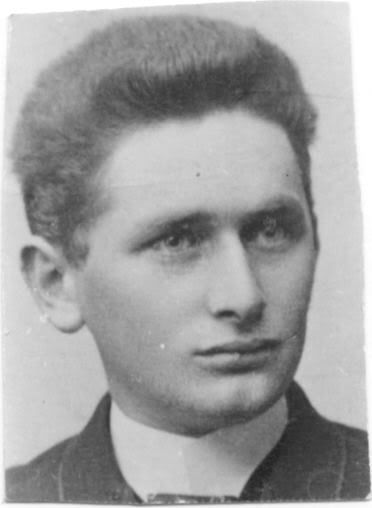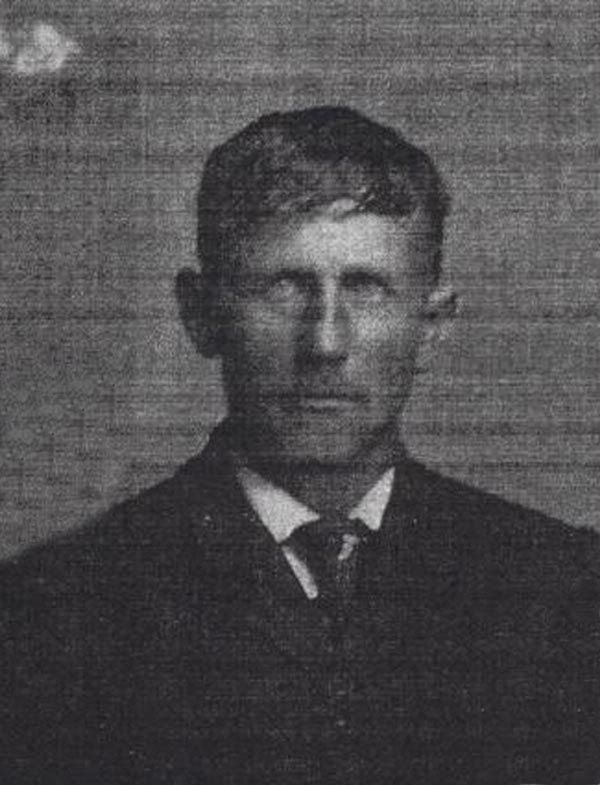Over a week ago, Jessica http://jazziejewel.spaces.live.com/default.aspx?owner=1asked the questions, “What is love? How deep is love? What is true friendship?” Well, I’m not much of a philosopher, and I couldn’t come up with a great answer for her, but it did get me thinking about such things. And my thinking usually leads me to my family stories. This time, my thoughts are on my Grandpa, George Haroldsen. I don’t know why questions of Love would lead me to thoughts of George. He couldn’t be described as a “Don Juan” by any stretch of the imagination. In fact most of the love stories that I have heard about him center on his blunders.
Oh… it makes sense now. I can relate!!!
George was a hard working, no nonsense sort of guy. Back in 1905, when my family moved from Hyrum, Utah to Idaho Falls, Idaho, 19 year old George was working up in Montana. In fact his earnings provided the earnest money for the new family farm.
A few months later when the neighbor girl, Kate Smith, came over to invite the new neighbor kids to her 16th birthday party, George wasn’t around to meet her. Later, when he got back into town, he asked his younger siblings lots of questions about the birthday girl.
Over the next few years, they “both did a lot of looking at each other” as George put it, but like I said, George was very slow and calculated in his love live. Nevertheless, Kate made sure she was frequently within his gaze, like when George was leaving on a train to accompany a shipment of cattle to Portland, Oregon, Kate was there to “wish him a good trip.” So eventually, George and Kate started to see each other a little bit. Kate thought they were getting serious, but then George made a big blunder.
He had just bought a beautiful new buggy. So here is a 23 year old eligible bachelor sporting around his new ride, and there was a dance coming up on Saturday night.
The town flirt decided that she wanted to go to the dance in style, and before George knew what happened, he had agreed to help her out by giving her a ride to the dance.
When Kate found out, she was furious. George really had to scramble to make amends with Kate again. And by the time he was back in her good graces, George was thinking of the future. Later in his life while recalling that time in his life, he philosophized, “Life without a mate, without a partnership, would be a flop.”
They were married June 9, 1909 in Kate’s family home and the next day, they were on the train to Salt Lake City, for their honeymoon. It was on this honeymoon trip in Salt Lake, that another George Haroldsen “blunder” happen.
One of George’s female cousins, who lived in Salt Lake City, showed them around the city. One stop was at the Photographer. George didn’t know until it was too late that Kate wouldn’t want his cousin to stand in the picture with them for their wedding photo. I have that picture of the three of them. It was their only wedding photograph.
Dumb guy… certainly not the Don Juan type with all the slick moves and right lines. But no woman experienced more loyalty or devotion than Kate did in her married life. George was a slow learner when it came to properly showing his love, but no one beat him in staying in love with his life’s partner. Unlike the new buggy story and the wedding picture story, no one and nothing got between George and his love for Kate. By his own definition, his life was not a flop.
I was 8 years old when after 59 years of marriage, Kate died within a week of discovering cancer. It was on leap year day, February 29th, 1968. George was devastated. But he tried to carry on. Along with continuing to do his farming (he was now 82 years old), in honor of Kate, he tried to keep everything in the home the way she had always done things. When I came to visit, I remember he still had cookies in the cookie jar (they weren’t the good ones Grandma had, but…) And like Kate had done before, the toys for us, the younger grandkids, were cleverly hid around the house so I could go searching for the “cool” toy truck, and my sisters would find the doll. One of my aunts reported that he did pretty well (with his daughter’s help) learning how to cook certain meals just the way Kate had done it, but she did catch him watering Kate’s plastic house plants.
June 7th, 1974 was a sad day I will never forget. George had been admitted into the hospital only a few days earlier. At the age of 86, it was his first hospital stay. With my father, I had visited him a few hours earlier, but he was sleeping for the whole visit. They said he died of a stroke. I really felt the loss. I hadn’t spent nearly enough time with him. But my sadness was sweetened at the thought, “Grandpa is with Grandma again. Now he is happy again.”
As I think about it, what my grandpa said fits in perfectly with my own philosophy. “Life without a mate, without a partnership, would be a flop.” I would consider my life a flop without my partner… without my “Beautiful Wife.”


